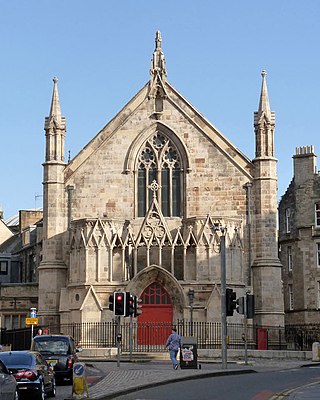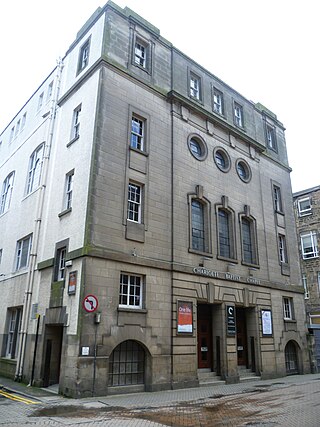Related Research Articles

The Edinburgh Festival Fringe is the world's largest performance arts festival, which in 2019 spanned 25 days and featured more than 59,600 performances of 3,841 different shows in 322 venues. Established in 1947 as an alternative to the Edinburgh International Festival, it takes place in Edinburgh every August. The Edinburgh Festival Fringe has become a world-leading celebration of arts and culture, surpassed only by the Olympics and the World Cup in terms of global ticketed events. As an event it "has done more to place Edinburgh in the forefront of world cities than anything else" according to historian and former chairman of the board, Michael Dale.
The Adelaide Fringe, formerly Adelaide Fringe Festival, is Australia’s Biggest Arts Festival and is the world's second-largest annual arts festival, held in the South Australian capital of Adelaide. Between mid-February and mid-March each year, it features more than 7,000 artists from around Australia and the world. Over 1,300 events are staged in hundreds of venues, which include work in a huge variety of performing and visual art forms. The Fringe features many free events occur alongside ticketed events for the duration of the festival.

The Adelaide Festival of Arts, also known as the Adelaide Festival, an arts festival, takes place in the South Australian capital of Adelaide in March each year. Started in 1960, it is a major celebration of the arts and a significant cultural event in Australia.

Jermyn Street Theatre is a performance venue situated on Jermyn Street, in London's West End. It is an off-west end studio theatre.

Appleton Tower is a tower block in Edinburgh, Scotland, owned by the University of Edinburgh.

The Scottish Storytelling Centre, the world's first purpose-built modern centre for live storytelling, is located on the High Street in Edinburgh's Royal Mile, Scotland, United Kingdom. It was formally opened on 1 June 2006 by Patricia Ferguson MSP, Minister for Culture in the Scottish Executive. Donald Smith is Director of the Scottish Storytelling Centre, and himself a storyteller, playwright, novelist and performance poet.

Fountainbridge is an area of Edinburgh, Scotland, a short distance west of the city centre, adjoining Tollcross with East Fountainbridge and West Port to the east, Polwarth to the west and south, Dalry and Haymarket to the north and Gorgie and North Merchiston to the west. The main streets through the area are Fountainbridge and Dundee Street.

The Edge Festival was an annual music festival held in Edinburgh, Scotland, during August of each year. Formerly known as T on the Fringe, The Edge was part of the Edinburgh Festival Fringe, the world's largest arts fringe festival. Unlike other music festivals, The Edge did not take place at one location, with performers instead playing numerous venues across the city during the month. The festival was founded under the T on the Fringe name by DF Concerts and Tennent's Lager, with DF continuing to promote the festival after the departure of Tennent's from 2008 until 2012.

The Orlando International Fringe Theatre Festival is a 14-day annual arts festival that takes place in Orlando, Florida every May. The festival features 850 ticketed theatrical performances on indoor and outdoor stages, produced by local, national and international artists. It is an open access performing arts festival, meaning there is no selection committee, and anyone may participate, with any type of performance.
Alistair Murray Moffat is a Scottish writer and journalist, former director of the Edinburgh Festival Fringe, and former Rector of the University of St Andrews.

Edinburgh University Theatre Company (EUTC) is a student theatre company at the University of Edinburgh. The EUTC was founded in 1871 as the Edinburgh University Amateur Dramatic Club and adopted its current name in the 1970s. Since 1980 it has run the Bedlam Theatre.
The 1947 Edinburgh Festival Fringe was the first edition of what would become the world's largest arts festival, the Edinburgh Festival Fringe.
The 1948 Edinburgh Festival Fringe was the second edition of what would become the world's largest arts festival, the Edinburgh Festival Fringe. It was in this year the word "Fringe" is commonly accepted as having first been associated with the event, after it was used by an Edinburgh Evening News critic. The term would come to define the event, and spawn the genre of fringe theatre. It was, however, still several years before it became common parlance in connection with the event or theatre in general, and also some time before any formal organisation of the event took place.
William Burdett-Coutts is the founder and director of theatre and comedy promotion company Assembly, one of the major venue operators at the Edinburgh Festival Fringe, the world's largest arts festival. He was the Chief Executive and Artistic Director of the Riverside Studios in London.
Food Tank : A Food Think Tank, is a 501(c)(3) non-profit organization founded in 2013 by Danielle Nierenberg, Bernard Pollack, and Ellen Gustafson to reform the food system. Its goal is to highlight environmentally, socially, and economically sustainable ways of alleviating hunger, obesity, and poverty.

The Royal Scots Club Edinburgh is a private members' club located at 29-31 Abercromby Street, Edinburgh, EH3 6QE Scotland.
Ella Al-Shamahi is an explorer, paleoanthropologist, evolutionary biologist, writer and stand-up comic. She specialises in the study of Neanderthals. She is also the presenter and producer of BBC2's Neanderthals: Meet Your Ancestors. She is a Trustee of the International Association for the Study of Arabia.

Holden Street Theatres (HST) is a South Australian performing arts theatre complex in Hindmarsh, an inner-western suburb of Adelaide. It is housed in the heritage-listed All Saints' Anglican Church complex. The complex includes three performance spaces: The Studio, The Arch and The Bar.

The Rose Theatre is an arts venue and Category B listed building on Rose Street, Edinburgh, Scotland, owned by ballet dancer and Olivier Award winning director Peter Schaufuss and is as a year round venue for theatre, comedy, music, dance and cabaret. It is also the home of the Rose Theatre Cafe. The venue is playing a major role during the Edinburgh Festival Fringe.
References
- ↑ "The Edinburgh Festival Fringe Society". The Edinburgh Festival Fringe Society.
- ↑ Street, 180 High; Edinburgh; Eh1 1qs; Kingdom +44131 226 0026, United. "Phoebe Waller-Bridge is the Fringe Society's first President". Edinburgh Festival Fringe. Retrieved 22 November 2022.
- ↑ Fisher 2012, p. 20.
- ↑ Fisher 2012, p. 21.
- 1 2 Dale 1988, p. 12.
- 1 2 "About the Edinburgh Festival Fringe". The Edinburgh Festival Fringe Society.
- ↑ Street, 180 High; Edinburgh; Eh1 1qs; Kingdom +44131 226 0026, United. "Benny Higgins appointed Chair of the Edinburgh Festival Fringe Society board". Edinburgh Festival Fringe. Retrieved 22 November 2022.
- ↑ "Kath M Mainland steps down as Chief Executive of the Edinburgh Festival Fringe Society". The Edinburgh Festival Fringe Society.
- ↑ "Shona McCarthy appointed as Chief Executive of Edinburgh Festival Fringe Society". The Edinburgh Festival Fringe Society.
- ↑ Street, 180 High; Edinburgh; Eh1 1qs; Kingdom +44131 226 0026, United. "Fringe development goals". Edinburgh Festival Fringe. Retrieved 22 November 2022.
- ↑ "Edinburgh Fringe Shop and Box Office". Edinburgh Guide.
- ↑ "Fringe Central" . Retrieved 24 July 2018.